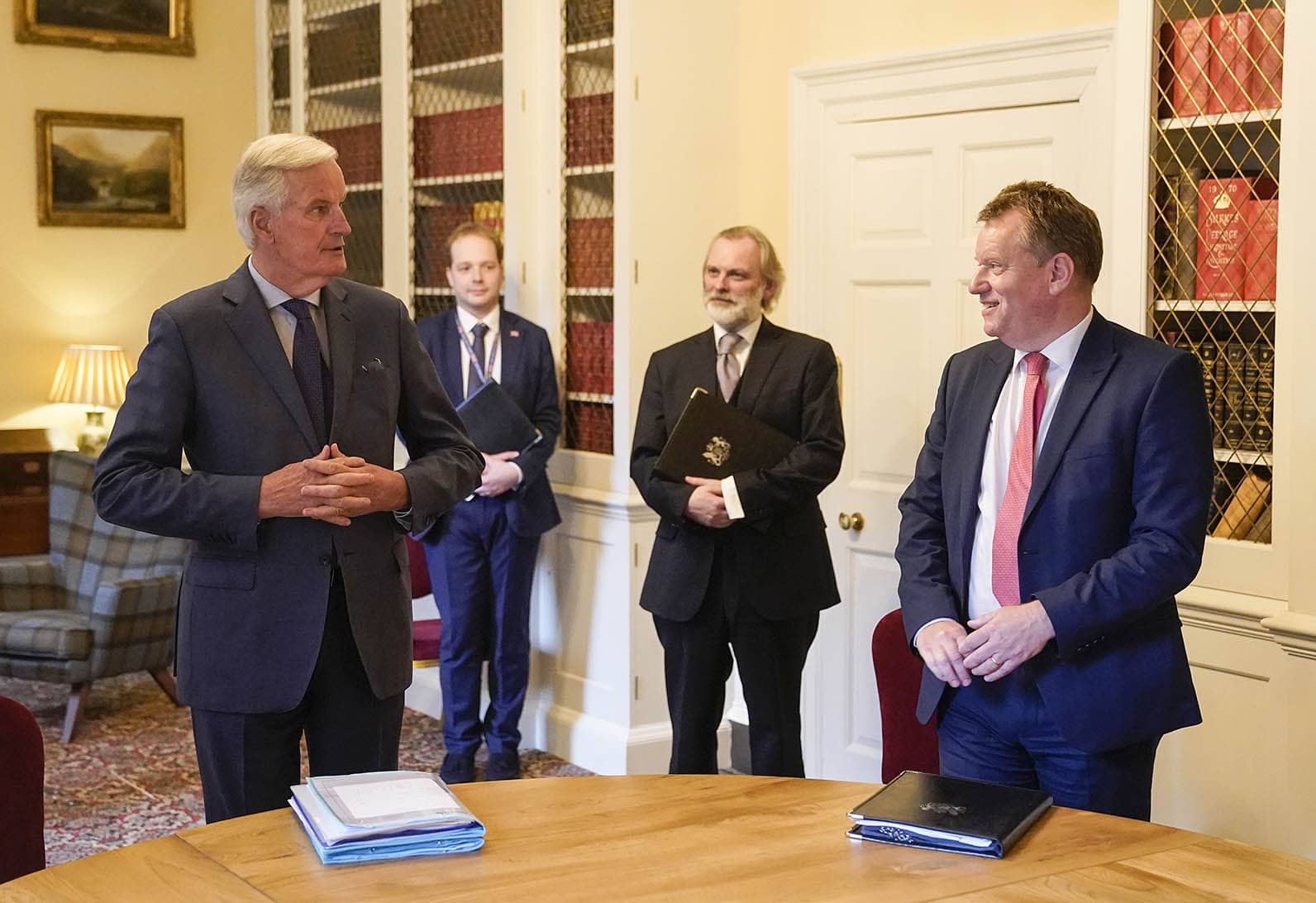Pound Sterling Firms on Hopes Final Brexit Trade Negotiations Deliver Progress
- GBP higher against EUR, USD
- Final round of Brexit trade talks start Tuesday
- Thurs post-negotiation briefing is week's highlight
- Analysts remain cautious on GBP's near-term prospects

Above: File image. European Union Chief Negotiator and Michel Barnier and UK Chief Negotiator David Frost. Picture by Andrew Parsons / No 10 Downing Street
- GBP/EUR spot: 1.0980 | GBP/USD spot: 1.2776
- GBP/EUR bank rates: 1.0773 | GBP/USD bank rates: 1.2518
- GBP/EUR specialist rates: 1.0880 | GBP/USD specialist rates: 1.2660
- Learn more about market beating exchange rates, here
The British Pound is trading higher against the Euro, Dollar and other major currencies at the start of the new week amidst improved sentiment to the outcome of Brexit trade negotiations, which are due to end this week with a Thursday post-negotiating briefing likely to be a highlight.
This week sees the ninth and final round of scheduled negotiations taking place, with news reports confirming the two sides remain optimistic that some kind of a deal will be struck by the time an important EU summit comes around in mid-October.
"What currently matters more for GBP is the idiosyncratic driver of the UK-EU trade negotiations outlook. With the easing in rhetoric from both sides, GBP has been therefore stable vs the EUR despite the falling markets," says Francesco Pesole, FX Strategist at ING Bank, referencing Sterling's relative resilience despite the recent slump in global stock markets.
The Pound-to-Euro exchange rate has recovered towards a two-week high at 1.0980 on Monday while the Pound-to-Dollar exchange rate is quoted at 1.2773. The GBP/USD has like all major currency pairs come under pressure of late due to a global USD rebound, and therefore the GBP/EUR remains the market's key gauge of Brexit-related sentiment.
Tuesday sees the negotiating teams reconvene in Brussels for three days of talks, meaning Thursday could be a critical day for the Pound as Chief Negotiators Barnier and Frost will likely update the press on the status of talks. Given this is the final official negotiation, the outcome of this briefing will be of huge significance for the future relationship of the EU and UK, as well as the Pound.
Pound Sterling started outperforming the Euro last week on the back of a slew of newswire and newspaper reports that background progress was being made in Brexit negotiations, news that caught some in the market off-guard given the relentlessly negative headlines on the matter that has characterised September.
It was reported on Thursday the EU was "open to a 'thin' Brexit deal" and that on the EU side there was "cautious optimism a deal can still be found".
"Ahead of the ninth formal round of Brexit trade talks in Brussels, there is a sense of cautious optimism a deal can still be found. Michel Barnier, while saying the UK's Internal Market Bill is 'unhelpful', has claimed the legislation created an 'opening', an EU source told Joe Barnes, Brussels Correspondent for The Express. "Even after a few turbulent weeks, technical-level negotiations are said to be progressing well. Barnier earlier this week briefed EU27 ministers, saying there is now a 'much more open atmosphere at the negotiating table', another source says."
The Financial Times on Monday quotes EU diplomats as saying that what is at stake this week is whether enough headway could be made to justify both sides entering into intensive "tunnel" talks of senior advisers, who would have the task of resolving the most difficult issues left on the table.
The newspaper reports the talks could run from the week of October 4 until an EU summit on October 15-16, a date which has for months been seen as the soft deadline for a trade deal to be reached.
It is however widely confirmed by senior national journalists covering Brexit talks that the two major outstanding issues relate to the state aid rules and fishing rights remain, issues that will require a notable climbdown from either or both sides.
The rise in Pound Sterling over the course of the past week is a an expression of the market raising their expected odds of a deal being reached, having sharply reduced them earlier in the month when a row broke out between the two sides regarding the trade of food stuffs between the rest of the UK and Northern Ireland.
The row came to a head when the UK published the Internal Markets Bill that sought to unilaterally override elements of the Withdrawal Agreement struck between the EU and UK last year, in order to guarantee the free trade of food within the UK in the future.
While the UK is still proceeding with the Bill they have delayed its passage to allow the EU to speed up commitments that ultimately ensure there will be no barrier to trade of food between the rest of the UK and Northern Ireland. It has been widely reported that the EU have in fact sped up the process of granting the UK 'third party' status for food imports, thereby defusing the row.
However, given the scale of the challenge of overcoming the final hurdles, some foreign exchange analysts remain cautious on the Pound in the event of disappointment.
"Nonetheless, given the roughly 50:50 chance of deal vs no deal, we continue to see GBP as inadequately priced for the risk presented, with limited risk premium built into GBP. We thus see risks to GBP on the downside," says Pesole.
"There has been a lot of talk in the market in recent weeks about whether or not sterling has now hit “peak bearishness”. Given the huge degree of political uncertainly faced by the UK in the coming months we would consider it foolhardy to rule out the prospect of further sharp losses for the pound," says Jane Foley, Senior FX Strategist at Rabobank.




